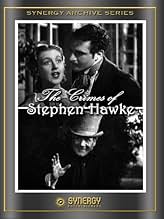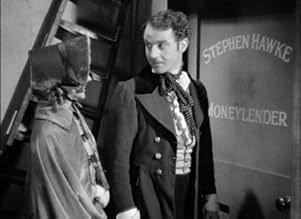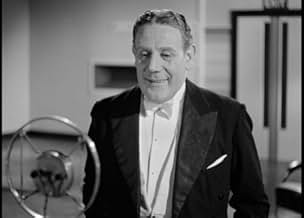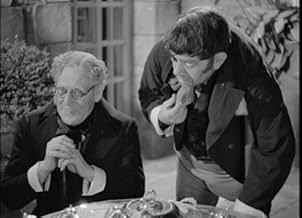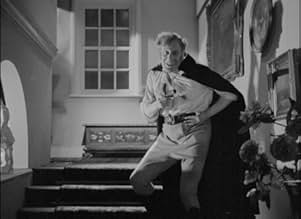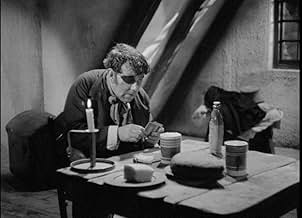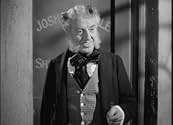Aggiungi una trama nella tua linguaA crazed killer known as "The Spinebreaker" is terrorizing London with a series of grisly murders. The police seem powerless to stop him.A crazed killer known as "The Spinebreaker" is terrorizing London with a series of grisly murders. The police seem powerless to stop him.A crazed killer known as "The Spinebreaker" is terrorizing London with a series of grisly murders. The police seem powerless to stop him.
- Regia
- Sceneggiatura
- Star
Graham Soutten
- Nathaniel
- (as Ben Soutten)
B.C. Hilliam
- Self
- (as Flotsam)
Malcolm 'Mr. Jetsam' McEachern
- Self
- (as Jetsam)
Cecil Bevan
- Small Boy's Father
- (non citato nei titoli originali)
Annie Esmond
- Small Boy's Nanny
- (non citato nei titoli originali)
Jack Sharp
- Policeman
- (non citato nei titoli originali)
Harry Terry
- First Prisoner
- (non citato nei titoli originali)
Ben Williams
- Prison Warder
- (non citato nei titoli originali)
Recensioni in evidenza
Meandering tale of meek money lender Steven Hawke (Slaughter) who moonlights as a callous killer nicknamed "The Spine Breaker" for his bone crushing exploits. When his alter ego is exposed, he's forced to flee London, pursued by a relentless hunter but must make a daring return after hearing news that his daughter has been coerced into marrying a blackmailing prison warden.
Great comical thrills with the inimitable Tod Slaughter delivering his trademark psychopath with pompous relish. Eric Portman is the principal adversary and preferred suitor to the twisted killer's beloved daughter (Taylor), demonstrating the thespian skills for which he became better known throughout the next three decades.
If you're unaccustomed to the Tod Slaughter experience, then this I'd regard to be one of the better samples to gain a taste of the stage-borne flavour with which he interprets his twisted characterisations. The dialogue is poetic, loaded with double-entendres, witty quips and of course, hopelessly clichéd plot. Despite the low budget, it works like a charm, such is Slaughter's unique charisma and presence.
Great comical thrills with the inimitable Tod Slaughter delivering his trademark psychopath with pompous relish. Eric Portman is the principal adversary and preferred suitor to the twisted killer's beloved daughter (Taylor), demonstrating the thespian skills for which he became better known throughout the next three decades.
If you're unaccustomed to the Tod Slaughter experience, then this I'd regard to be one of the better samples to gain a taste of the stage-borne flavour with which he interprets his twisted characterisations. The dialogue is poetic, loaded with double-entendres, witty quips and of course, hopelessly clichéd plot. Despite the low budget, it works like a charm, such is Slaughter's unique charisma and presence.
The Crimes of Stephen Hawke kicks off with a tune from Flotsam and Jetsam - sadly, not the '80s thrash band (that would be cool!), but rather a musical comedy duo, Mr. Flotsam sat at the piano singing like George Formby, with Mr. Jetsam, a heftier dude with a deeper voice, standing. They're performing as part of the radio show that is the pre-amble to the film's main story. After Flotsam and Jetsam, we get a comedic butcher called Henry Hopkins, who sells cat meat, followed by an interview with actor Tod Slaughter, who talks about the many murders he has committed on screen, playing characters such as the infamous barber Sweeney Todd, and this film's maniac, crazed 'spine-breaker' Stephen Hawke.
Mr. Hawke is a seemingly affable moneylender who secretly makes extra cash on the side by snapping the backs of the wealthy with his bare hands and stealing their valuables. He is aided in his nefarious work by one of the best sidekicks I have seen in an old black and white horror: the guy not only has a hunchback (standard issue for drooling horror henchmen of the day), but he also has only one leg and one eye. Unlucky for him, but great for fans of cheesy B-movies.
When Hawke's friend Joshua Trimble discovers the terrible truth about the evil moneylender, he also has his spine snapped, leaving Trimble's son Matthew (Eric Portman), who is in love with Hawke's adopted daughter Julia (Marjorie Taylor), to take revenge.
After pursuing Hawke across the country with no success, Matthew gives up and returns to London in time to save Julia from scoundrel Miles Archer, who has blackmailed the poor girl into marrying him. Meanwhile, Hawke returns to London, ready for the film's finalé, which, in time-honoured fashion, sees the villain take to the rooftops and fall to his death - right in front of poor Julia's eyes.
Tod Slaughter, Britain's answer to the likes of Boris Karloff and George Zucco, puts in another wonderful theatrical performance - all wild eyes, evil leers, and exaggerated movements - that is perfect for the occasion. He doesn't have a moustache to twirl or a cape to swish, but if he did, he would. It almost feels mandatory to boo and hiss at the screen whenever he makes an entrance. While not the greatest story ever told, The Crimes of Stephen Hawke is still a lot of fun thanks to its star's special brand of ham/cheeze, the likes of which I doubt we will ever see again, and the rather strange wraparound radio broadcast that is just too bizarre not to be entertaining.
Mr. Hawke is a seemingly affable moneylender who secretly makes extra cash on the side by snapping the backs of the wealthy with his bare hands and stealing their valuables. He is aided in his nefarious work by one of the best sidekicks I have seen in an old black and white horror: the guy not only has a hunchback (standard issue for drooling horror henchmen of the day), but he also has only one leg and one eye. Unlucky for him, but great for fans of cheesy B-movies.
When Hawke's friend Joshua Trimble discovers the terrible truth about the evil moneylender, he also has his spine snapped, leaving Trimble's son Matthew (Eric Portman), who is in love with Hawke's adopted daughter Julia (Marjorie Taylor), to take revenge.
After pursuing Hawke across the country with no success, Matthew gives up and returns to London in time to save Julia from scoundrel Miles Archer, who has blackmailed the poor girl into marrying him. Meanwhile, Hawke returns to London, ready for the film's finalé, which, in time-honoured fashion, sees the villain take to the rooftops and fall to his death - right in front of poor Julia's eyes.
Tod Slaughter, Britain's answer to the likes of Boris Karloff and George Zucco, puts in another wonderful theatrical performance - all wild eyes, evil leers, and exaggerated movements - that is perfect for the occasion. He doesn't have a moustache to twirl or a cape to swish, but if he did, he would. It almost feels mandatory to boo and hiss at the screen whenever he makes an entrance. While not the greatest story ever told, The Crimes of Stephen Hawke is still a lot of fun thanks to its star's special brand of ham/cheeze, the likes of which I doubt we will ever see again, and the rather strange wraparound radio broadcast that is just too bizarre not to be entertaining.
You owe it to yourself to see at least one Tod Slaughter film. His signature movie Sweeney Todd, The Demon Barber of Fleet Street or the career overview Crimes at the Dark House are two of the best examples, but The Crimes of Stephen Hawke is a worthwhile introduction to his work. Like most of the early Slaughter movies it seems uneasy about the (then) new film medium favouring more common forms of entertainment. His debut film Maria Marten or the Murder in the Red Barn opens with the entire cast being introduced like in a play and Crimes opens like a radio show complete with some hard to watch variety acts (singers Flotsom and Jetsom and a `comic' butcher) before Tod Slaughter is brought on to introduce his latest piece of `Strong Meat'. In the subsequent film/ radio play Slaughter (real name: Norman Carter Slaughter) plays the title role, an outwardly respectable moneylender who is really serial killer `The Spinebreaker' nicknamed for his ability to snap his victim's spines. His long time friend Joshua becomes his latest victim, however upon discovering the guilty party Jossua's son seeks revenge, forcing Hawke and his sidekick, an eyepatch wearing, one legged hunchback to flee, leaving Hawke's adopted daughter in the blackmailing hands of an upper class `lecherous brute'. For a film that barely passes the hour mark this manages to cram allot in, including a fake `talking' corpse, Hawke sent to jail for a year (for stealing a loaf of bread!), the obligatory romance, the honest guy vs the slimey rich guy for Hawke's daughter's hand and even some unexpected sensitivity. Its worth noting that the British censors banned all horror films during the WW2 years, although this falls a few years short of the censor's ban, during that time Slaughter was still making `meldrodramas' with tent pegs pounded into heads, human flesh stuffed into meat pies and lines like `I'll feed your entrails to the pigs' that were far more lurid than any banned Hollywood horror movie. Crimes opens to a sadistic scene where a pompous child is attacked by Slaughter and has his back broken, such scenes like that are not common in British movies of the time. Equally don't look for sub-plots about people being tortured with whips in Ealing comedies. Yet Slaughter's performance is incredible, extremely theatrical and barnstorming par excellence. You can almost hear the boos from the audience as he exits a scene giggling and cackling after `coming to grips' with some unfortunate. Some of the berserk expressions he makes in this film as he breaks spines makes it hard to believe he hadn't completely lost his mind. Call it hammy or over the top, but you'll never forget it. The director George King deserves credit for preserving most of Slaughter's body of work on film (even if he doesn't do it very well). Seemingly more comfortable on stage than on film, Slaughter's movies are little more than filmed plays, with cardboard sets, minimal (if any) camera movement, and unexceptional repertory players. Slaughter is the only reason to watch any of his films, for further proof see King's other Slaughter-less films like The Case of the Frightened Lady (1941) the old magic simply isn't there. Tales from Slaughter's theatre days are both hilarious and the stuff of legend. Actresses not needed would dress as nurses (in case anyone died of a heart attack), while Slaughter reviled in the sort of grand guignol butchery that could never be shown on film and would walk around after the show in blood stained clothes. Whether all these tales are true its hard to know. My relatives remember seeing the guy `live' sometime in the Forties and the man himself definitely left an impression running around the audience covered in blood (actually beetroot juice), waving a big knife and offering to `polish people off'. Now dead for nearly half a century, Slaughter's films are the nearest we'll ever come to experiencing such mad genius first hand. Technically the movies should be unwatchable, but they exert a strange fascination that you'll have to see for yourself, there really hasn't been anything like them before or since.
On the positive, Tod Slaughter did a great job of playing Stephen Hawke, there seems to be little 'extras' in making the characters a bit unique. He reminded me a bit of George C. Scott in action like Mr. Scrooge and Jon Pertwee in visual acting. The first half was a slick story, albeit a little slow to start. The ending was interesting, so not disappointed there either.
Writing became a bit unraveled half way through though, characters seem to be 'slipping' and the damsel in distress a bit static. Villains and heroes announce their plans to their adversary and delay actions that would guarantee success. Instead, they opt for gamesmanship presumably to build superficial drama.
The book-ending of a radio show was odd, awkward, and not really surprised to see the man snoozing in the chair. Funny, but accurate. If you've got the time, then the film is an okay watch, but not likely memorable.
Writing became a bit unraveled half way through though, characters seem to be 'slipping' and the damsel in distress a bit static. Villains and heroes announce their plans to their adversary and delay actions that would guarantee success. Instead, they opt for gamesmanship presumably to build superficial drama.
The book-ending of a radio show was odd, awkward, and not really surprised to see the man snoozing in the chair. Funny, but accurate. If you've got the time, then the film is an okay watch, but not likely memorable.
THE CRIMES OF STEPHEN HAWKE opens with a rather lengthy radio program featuring the creaky musical duo, "Flotsam and Jetsam", and a man telling a story. Then, finally, Mr. Tod Slaughter himself arrives to recount some of his most devilish film roles.
When the actual story begins, we are introduced to the title character, known by the public at large as: The Spine Breaker (Mr. Slaughter). True to form, a victim is claimed within a few minutes. Hawke is presented as insidious right out of the gate! Mr. Slaughter once again portrays his villain as the embodiment of murderous glee.
Hawke also has a contrived persona as a kindly moneylender. No one suspects him of actually being a cackling psychopath, not even his daughter. This ruse helps to keep the entertainment level high, as we know full well what this monster is up to. There are some fun, sinister double entendres from Mr. Hawke about his crimes.
Fans of Tod Slaughter will love this film. The uninitiated will marvel at his ability to chew through scenery like a nuclear-powered buzz saw!...
When the actual story begins, we are introduced to the title character, known by the public at large as: The Spine Breaker (Mr. Slaughter). True to form, a victim is claimed within a few minutes. Hawke is presented as insidious right out of the gate! Mr. Slaughter once again portrays his villain as the embodiment of murderous glee.
Hawke also has a contrived persona as a kindly moneylender. No one suspects him of actually being a cackling psychopath, not even his daughter. This ruse helps to keep the entertainment level high, as we know full well what this monster is up to. There are some fun, sinister double entendres from Mr. Hawke about his crimes.
Fans of Tod Slaughter will love this film. The uninitiated will marvel at his ability to chew through scenery like a nuclear-powered buzz saw!...
Lo sapevi?
- QuizMarjorie Taylor's debut.
- Citazioni
Joshua Trimble: Yes, my boy. When people talk of flint-hearted money-lenders, they can't have met Stephen!
- ConnessioniFeatured in La casetta degli orrori (1988)
I più visti
Accedi per valutare e creare un elenco di titoli salvati per ottenere consigli personalizzati
Dettagli
- Tempo di esecuzione1 ora 9 minuti
- Colore
- Mix di suoni
- Proporzioni
- 1.37 : 1
Contribuisci a questa pagina
Suggerisci una modifica o aggiungi i contenuti mancanti

Divario superiore
By what name was The Crimes of Stephen Hawke (1936) officially released in Canada in English?
Rispondi
